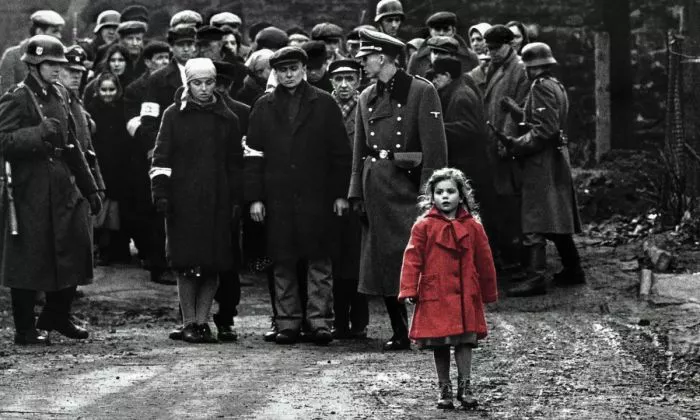“Schindler’s List,” directed by Steven Spielberg and released in 1993, is a powerful and haunting film that tells the true story of Oskar Schindler, a German businessman who saved the lives of over a thousand Polish-Jewish refugees during the Holocaust. The film is based on the novel “Schindler’s Ark” by Thomas Keneally and stars Liam Neeson as Oskar Schindler, with supporting performances by Ben Kingsley and Ralph Fiennes. “Schindler’s List” is widely regarded as one of the greatest films ever made, earning critical acclaim for its emotional impact, historical accuracy, and artistic merit. In this review, we will delve into the film’s themes, performances, direction, and overall impact.
Plot Summary
“Schindler’s List” follows the story of Oskar Schindler, a German businessman who arrives in Kraków, Poland, during World War II with ambitions to profit from the war economy. Schindler soon establishes a factory producing enamelware, employing Jewish workers from the nearby ghetto to maximize his profits. As Schindler witnesses the atrocities committed against the Jewish population by the Nazis, including the liquidation of the Kraków ghetto and the deportation of Jews to concentration camps, he undergoes a transformation.
Driven by a sense of humanity and empathy, Schindler gradually transitions from a profit-seeking opportunist to a compassionate savior. With the help of his accountant, Itzhak Stern (played by Ben Kingsley), Schindler employs increasing numbers of Jewish workers in his factory, ultimately aiming to save as many lives as possible from the horrors of the Holocaust. Through bribery, manipulation, and personal sacrifice, Schindler manages to protect over a thousand Jews from deportation to Auschwitz, earning him a place in history as a righteous gentile who risked everything to defy the Nazis.
Themes and Symbolism
“Schindler’s List” is a profound exploration of several key themes that resonate deeply with viewers:
1. Human Goodness and Heroism
At its core, the film celebrates the capacity for human goodness and heroism, embodied by Oskar Schindler’s transformation from a self-interested businessman to a compassionate protector of lives. Schindler’s actions demonstrate the importance of individual moral choices in the face of overwhelming evil.
2. Moral Responsibility
The film confronts the notion of moral responsibility, highlighting the devastating consequences of indifference and complicity in the face of injustice. Schindler’s journey underscores the importance of taking a stand against oppression and actively resisting tyranny.
3. Loss and Remembrance
“Schindler’s List” grapples with the profound loss and suffering endured by the Jewish people during the Holocaust. The film serves as a poignant reminder of the atrocities committed by the Nazis and the imperative to remember and honor the victims.
Performances and Direction
1. Liam Neeson as Oskar Schindler
Liam Neeson delivers a tour de force performance as Oskar Schindler, embodying the complexity and emotional depth of the character. Neeson’s portrayal captures Schindler’s transformation with subtlety and nuance, from his initial opportunism to his profound sense of guilt and redemption.
2. Ralph Fiennes as Amon Goeth
Ralph Fiennes delivers a chilling and terrifying performance as Amon Goeth, the sadistic SS officer responsible for overseeing the Plaszów concentration camp. Fiennes brings a menacing charisma to the role, portraying Goeth’s brutality and inner turmoil with haunting authenticity.
3. Steven Spielberg’s Direction
Steven Spielberg’s direction in “Schindler’s List” is masterful and restrained, allowing the story’s emotional weight to unfold organically. Spielberg’s use of black-and-white cinematography, coupled with handheld camera work and minimalistic music, creates a stark and immersive visual experience that enhances the film’s documentary-like realism.
Historical Accuracy and Impact
“Schindler’s List” is renowned for its historical accuracy and attention to detail, drawing from survivor testimonies and archival research to authentically depict the events of the Holocaust. The film’s impact extends beyond its artistic achievements, catalyzing widespread discussions about genocide, morality, and the enduring legacy of the Holocaust.
Critical Reception and Legacy
Upon its release, “Schindler’s List” received widespread critical acclaim, earning seven Academy Awards including Best Picture and Best Director for Spielberg. The film’s success elevated public awareness of the Holocaust and inspired subsequent generations to confront the dark chapters of history with empathy and understanding.
Conclusion
“Schindler’s List” is a cinematic masterpiece that transcends its status as a film to become a profound testament to the resilience of the human spirit and the imperative to confront evil with courage and compassion. Through its powerful storytelling, exceptional performances, and uncompromising vision, Steven Spielberg’s film continues to resonate with audiences as a timeless and essential work of art. “Schindler’s List” serves as a poignant reminder of the horrors of the Holocaust and a testament to the enduring power of empathy and moral courage in the face of adversity.
Related Topics:
Celebrity Introduction – Hiroyuki Sanada

